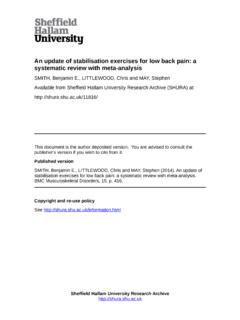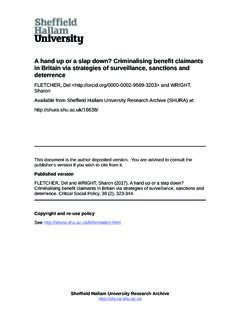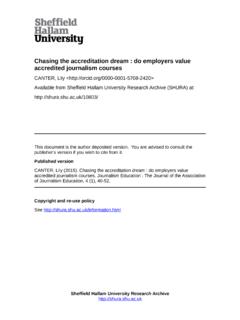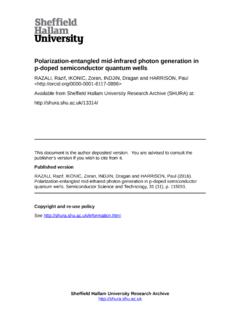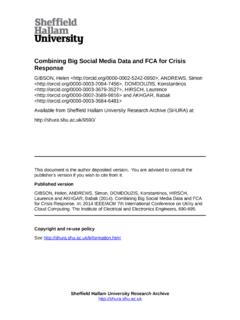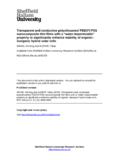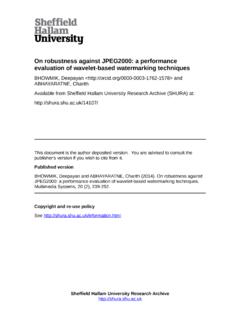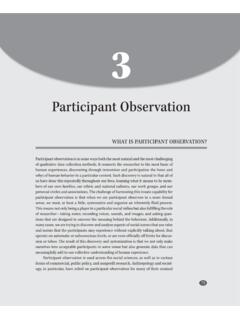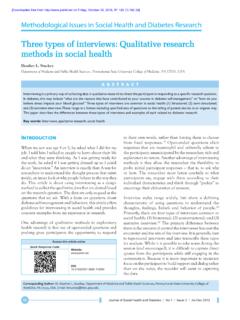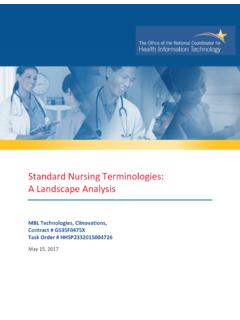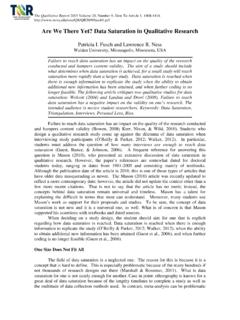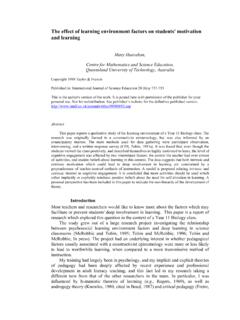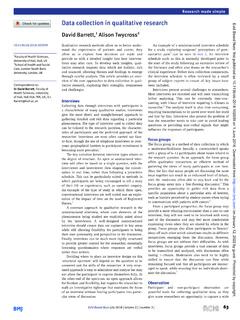Transcription of Ethical issues in the use of in-depth interviews ...
1 Ethical issues in the use of in-depth interviews : literature review and discussionALLMARK, P. J. < >, BOOTE, J., CHAMBERS, E., CLARKE, A., MCDONNELL, A., THOMPSON, A. and TOD, from Sheffield Hallam University Research Archive (SHURA) at: document is the author deposited version. You are advised to consult the publisher's version if you wish to cite from versionALLMARK, P. J., BOOTE, J., CHAMBERS, E., CLARKE, A., MCDONNELL, A., THOMPSON, A. and TOD, A. (2009). Ethical issues in the use of in-depth interviews : literature review and discussion. Research ethics review, 5 (2), 48-54. Copyright and re-use policySee Hallam University Research and in-depth interviews : literature review 1 Title: Ethical issues in the use of in-depth interviews : literature review and discussion Note: This is a resubmission made in the light of referees' comments.
2 Corresponding Author: Peter Allmark, Centre for Health and Social Care Research, Sheffield Hallam University, 32 Collegiate Crescent, Sheffield S10 2BP. E-mail: Phone: 0114 225 5727. Fax: 0114 225 5495. Co-authors: Jonathan Boote, Research Design Service for Yorkshire and the Humber, University of Sheffield, Sheffield UK Eleni Chambers, School of Health and Related Research, University of Sheffield, Sheffield UK Amanda Clarke, Centre of Academic Primary Care, University of Aberdeen, Aberdeen UK Ann McDonnell, Faculty of Health and Wellbeing, Sheffield Hallam University, Sheffield UK Andrew Thompson, Department of Psychology, University of Sheffield, Sheffield UK Angela Tod, Centre for Health and Social Care Research, Sheffield Hallam University, Sheffield UK Word count: 3793 Key words: Ethics, research, qualitative, interview , professional Ethics and in-depth interviews : literature review 2 Title.
3 Ethical issues in the use of in-depth interviews : literature review and discussion Abstract This paper reports a literature review on the topic of Ethical issues in in-depth interviews . The review returned three types of article: general discussion, issues in particular studies, and studies of interview -based research ethics. Whilst many of the issues discussed in these articles are generic to research ethics, such as confidentiality, they often had particular manifestations in this type of research. For example, privacy was a significant problem as interviews sometimes probe unexpected areas. For similar reasons, it is difficult to give full information of the nature of a particular interview at the outset, hence informed consent is problematic.
4 Where a pair is interviewed (such as carer and cared-for) there are major difficulties in maintaining confidentiality and protecting privacy. The potential for interviews to harm participants emotionally is noted in some papers, although this is often set against potential therapeutic benefit. As well as these generic issues , there are some Ethical issues fairly specific to in-depth interviews . The problem of dual role is noted in many papers. It can take many forms: an interviewer might be nurse and researcher, scientist and counsellor, or reporter and evangelist. There are other specific issues such as taking sides in an interview , and protecting vulnerable groups. Little specific study of the ethics of in-depth interviews has taken place.
5 However, that which has shows some important findings. For example, one study shows participants are not averse to discussing painful issues provided they feel the study is worthwhile. Some papers make recommendations for researchers. One such is that they should consider using a model of continuous (or process) consent rather than viewing consent as occurring once, at signature, prior to the interview . However, there is a need for further study of this area, both philosophical and empirical. [291 words] Ethics and in-depth interviews : literature review 3 Title: Ethical issues in the use of in-depth interviews : literature review and discussion Introduction The use of in-depth interviews is common in qualitative research and such studies are subject to scrutiny by ethics committees.
6 In -depth interviews are usually semi-structured or unstructured ; the interviewer has topics and open-ended questions on which to focus discussion rather than a list of closed questions. They are usually carried out on a one-to-one basis. However, they sometimes occur with a pair or small team of interviewees; for example, an interview might take place between a carer and the person cared for. The in-depth nature of the interviews lies in the intention of the interviewer to uncover details of the interviewee's experience that would be undisclosed in, say, a questionnaire. The authors of this paper have been involved in research projects that used in-depth interviews .
7 Our experience, and that of colleagues, is that such research can give rise to Ethical issues and concerns. This led us to the question of what issues ethics committees should consider when reviewing such projects. And what questions should the researchers themselves address in setting up and running such studies? This paper is a discursive literature review on the Ethical issues that researchers and academics have identified as related to in-depth interviews . Method Two researchers independently conducted the literature review which was completed in July 2008. The following databases were searched: ASSIA (1987-present); Cinahl (1982-present); EMBASE (1980-present); International Bibliography of the Social Sciences (1951-present); Medline (1966-present); Philosopher s Index (1940-present); PSYC info (1887-present); Sociological abstracts (1963-present); and Web of Science (1900-present).
8 The terms used were qualitative research OR qualitative studies ; interviews OR interview studies ; Ethics and in-depth interviews : literature review 4 counselling ; ethic(s) OR moral OR dilemma . The Web of Science search was performed first and the search terms were looked for in all areas of the publications. This returned a large number of irrelevant articles; in subsequent searches we limited our search to title and abstract only. All were limited to English language. Some references were also obtained through serendipitous routes, such as personal recommendations and chance finds. A total of 88 references of clear relevance were returned. These were entered onto the reference database, RefWorks.
9 The 88 references were placed into three main categories. The first were discussion papers: these discussed Ethical issues related to in-depth interviews but were not specifically connected to any research study [1-35]. The second were study-connected papers: here the authors described and discussed Ethical issues arising from a particular studies that had used in-depth interviews [36-81]. The third were empirical studies that focussed on Ethical issues related to in-depth interviews [82-88]. The review methods had limitations. For example, the initial examination of the papers was limited to title and abstract; any papers that discuss Ethical issues but made no reference to the discussion in the abstract are, therefore, excluded.
10 As such, this review is best seen as comprehensive rather than systematic. However, the findings in terms of the themes discussed in the literature are reasonably robust. The remainder of this paper is organised under three broad headings: themes, studies of in-depth interview -based research, and recommendations. Themes Privacy and confidentiality Privacy as an issue per se and not simply an element of confidentiality is identified in a number of papers [4, 17, 27, 30, 31, 34, 37, 40, 50, Ethics and in-depth interviews : literature review 5 55, 65, 66, 70, 74]. interviews can delve into areas unanticipated at the outset. Furthermore, there is a danger of voyeurism and the temptation to focus on the most sensational elements of a study [47, 53] and to pick sensational phenomena to study [52].
